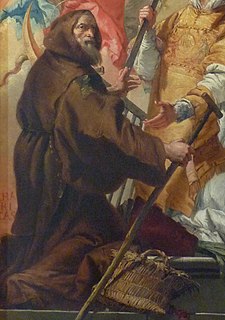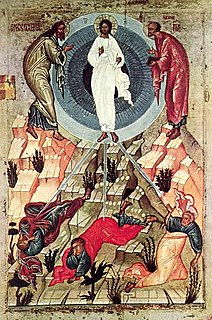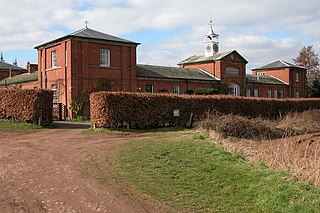
The Eastern Orthodox Church, officially the Orthodox Catholic Church, is the second-largest Christian church, with approximately 220 million baptised members. It operates as a communion of autocephalous churches, each governed by its bishops in local synods. The church has no central doctrinal or governmental authority analogous to the bishop of Rome (Pope), but the ecumenical patriarch of Constantinople is recognised by all bishops as primus inter pares and regarded as the representative and spiritual leader of Eastern Orthodox Christians. As one of the oldest surviving religious institutions in the world, the Eastern Orthodox Church has played a prominent role in the history and culture of Eastern and Southeastern Europe, the Caucasus, and the Near East.

Francis of Assisi, venerated as Saint Francis of Assisi, also known in his ministry as Francesco, was an Italian Catholic friar, deacon, mystic, and preacher. He founded the men's Order of Friars Minor, the women's Order of St. Clare, the Third Order of St. Francis and the Custody of the Holy Land. Francis is one of the most venerated religious figures in Christianity.

Bartholomew I is the 270th and current archbishop of Constantinople and ecumenical patriarch, since 2 November 1991. In accordance with his title, he is regarded as the primus inter pares in the Eastern Orthodox Church, and as the spiritual leader of the Eastern Orthodox Christians worldwide.

The Franciscans are a group of related mendicant Christian religious orders, primarily within the Catholic Church. Founded in 1209 by Saint Francis of Assisi, these orders include the Order of Friars Minor, the Order of Saint Clare, and the Third Order of Saint Francis. They adhere to the teachings and spiritual disciplines of the founder and of his main associates and followers, such as Clare of Assisi, Anthony of Padua, and Elizabeth of Hungary. Several smaller Protestant Franciscan orders exist as well, notably in the Anglican and Lutheran traditions.

Ecumenism, also spelled oecumenism, is the concept and principle in which Christians who belong to different Christian denominations work together to develop closer relationships among their churches and promote Christian unity. The adjective ecumenical is thus applied to any interdenominational initiative that encourages greater cooperation between Christians and their churches.

A friar is a brother and a member of one of the mendicant orders founded in the twelfth or thirteenth century; the term distinguishes the mendicants' itinerant apostolic character, exercised broadly under the jurisdiction of a superior general, from the older monastic orders' allegiance to a single monastery formalized by their vow of stability. The most significant orders of friars are the Dominicans, Franciscans, Augustinians, and Carmelites.

Francis of Paola, O.M., was an Italian mendicant friar and the founder of the Roman Catholic Order of Minims. Unlike the majority of founders of men's religious orders, and like his patron saint, Francis was never ordained a priest.

Foolishness for Christ refers to behavior such as giving up all one's worldly possessions upon joining an ascetic order or religious life, or deliberately flouting society's conventions to serve a religious purpose—particularly of Christianity. Such individuals have historically been known as both "holy fools" and "blessed fools". The term "fool" connotes what is perceived as feeblemindedness, and "blessed" or "holy" refers to innocence in the eyes of God.
Apostolic poverty is a Christian doctrine professed in the thirteenth century by the newly formed religious orders, known as the mendicant orders, in direct response to calls for reform in the Roman Catholic Church. In this, these orders attempted to live their lives without ownership of lands or accumulation of money, following the precepts given to the seventy disciples in the Gospel of Luke (10:1-24), and succeeding to varying degrees. The ascetic Pope Paschal II's solution of the Investiture Controversy in his radical Concordat of 1111 with the Emperor, repudiated by the cardinals, was that the ecclesiastics of Germany should surrender to the imperial crown their fiefs and secular offices. Paschal proved to be the last of the Gregorianist popes.

Christian monasticism is the devotional practice of Christians who live ascetic and typically cloistered lives that are dedicated to Christian worship. It began to develop early in the history of the Christian Church, modeled upon scriptural examples and ideals, including those in the Old Testament, but not mandated as an institution in the scriptures. It has come to be regulated by religious rules and, in modern times, the Canon law of the respective Christian denominations that have forms of monastic living. Those living the monastic life are known by the generic terms monks (men) and nuns (women). The word monk originated from the Greek μοναχός, itself from μόνος meaning 'alone'.

Marian hymns are Christian songs focused on Mary, mother of Jesus. They are used in both devotional and liturgical services, particularly by the Roman Catholic, Eastern Orthodox, Anglican, and Lutheran churches. They are often used in the month of May devotions. Some have also been adopted as Christmas hymns. Marian hymns are not popular among Protestants, as many Protestants see Marian veneration as idolatry. However, the practice is very common among Christians of Catholic traditions, and a key component of the Eastern Orthodox liturgy. There are many more hymns to Mary within the Eastern Orthodox yearly cycle of liturgy than in Roman Catholic liturgy.

The term Third Order signifies, in general, lay members of religious orders, who do not necessarily live in community and yet can claim to wear the habit and participate in the good works of some great order. Roman Catholicism, Lutheranism and Anglicanism all recognize Third Orders. They were a twelfth-century adaptation of the medieval monastic confraternities.

The Society of Saint Francis (SSF) is a Franciscan religious order within the Anglican Communion. It is the main recognised Anglican Franciscan order, but there are also other Franciscan orders in the Anglican Communion.

Anglican religious orders are communities of men or women in the Anglican Communion who live under a common rule of life. The members of religious orders take vows which often include the traditional monastic vows of poverty, chastity and obedience, or the ancient vow of stability, or sometimes a modern interpretation of some or all of these vows. Members may be laity or clergy, but most commonly include a mixture of both. They lead a common life of work and prayer, sometimes on a single site, sometimes spread over multiple locations.

The Secular Franciscan Order is the third branch of the Franciscan Family formed by Catholic men and women who seek to observe the Gospel of Jesus by following the example of Francis of Assisi. Secular Franciscans are not like the other third orders, since they are not under the higher direction of the same institute. Brothers and sisters of the Secular Franciscan Order profess to their own Rule, and Secular Franciscan fraternities can exist without the presence of the first or second Franciscan Orders. The Secular Franciscan Order was the third of the three families founded by Francis of Assisi 800 years ago.

Franciscan spirituality in Protestantism refers to spirituality in Protestantism inspired by the Catholic friar Saint Francis of Assisi. Emerging since the 19th century, there are several Protestant adherent and groups, sometimes organised as religious orders, which strive to adhere to the teachings and spiritual disciplines of Saint Francis of Assisi.

Clare of Assisi was an Italian saint and one of the first followers of Francis of Assisi. She founded the Order of Poor Ladies, a monastic religious order for women in the Franciscan tradition, and wrote their Rule of Life, the first set of monastic guidelines known to have been written by a woman. Following her death, the order she founded was renamed in her honour as the Order of Saint Clare, commonly referred to today as the Poor Clares. Her feast day is on 11 August.

The Eastern Roman (Byzantine) imperial church headed by Constantinople continued to assert its universal authority. By the 13th century this assertion was becoming increasingly irrelevant as the Eastern Roman Empire shrank and the Ottoman Turks took over most of what was left of the Byzantine Empire. The other Eastern European churches in communion with Constantinople were not part of its empire and were increasingly acting independently, achieving autocephalous status and only nominally acknowledging Constantinople's standing in the Church hierarchy. In Western Europe the Holy Roman Empire fragmented making it less of an empire as well.

In Western Christianity, the Transitus refers to "the time of passage through death to life".

The Order of Friars Minor is a mendicant Catholic religious order, founded in 1209 by Francis of Assisi. The order adheres to the teachings and spiritual disciplines of the founder and of his main associates and followers, such as Clare of Assisi, Anthony of Padua, and Elizabeth of Hungary, among many others. The Order of Friars Minor is the largest of the contemporary First Orders within the Franciscan movement.


















